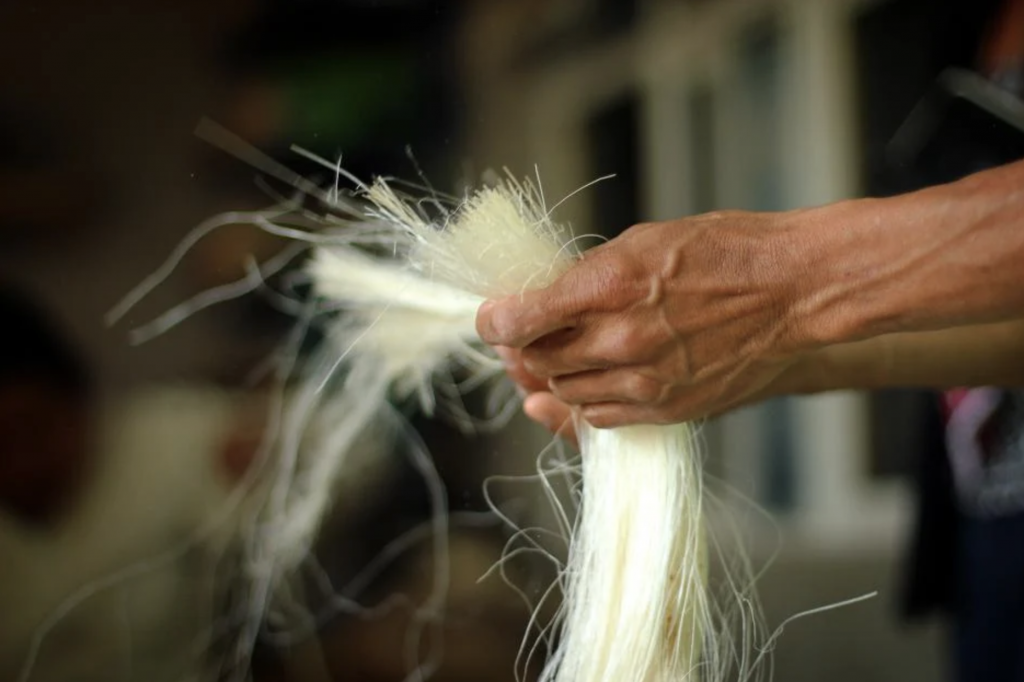BIOFIBERS TO WEAVE A SUSTAINABLE FUTURE
At Sisal Tejidos Yucatán, we believe in a world where quality and sustainability work hand in hand to pursue innovative and ecological solutions to improve people’s quality of life. Our focus is on using natural fibers like Sisal (Henequen) as an alternative to the synthetic and plastic fibers that harm our oceans and the planet.
WHAT ARE WE THINKING ABOUT!
The Ecological Disaster of Synthetic Fibres
Surely, you have heard about the problem of plastic pollution on our planet, especially in our oceans. More than 9 million tons of plastic waste are dumped into our rivers and seas every year, which is equivalent in weight and volume to approximately 160 blue whales, the largest living being in our oceans, or 3 African elephants, every day. That means that every minute that passes, the equivalent of the largest land animal on our planet, 9 tons of plastic waste are dumped into the ocean. In other words, since you started reading this paragraph, another 9 tons of plastic waste has been disposed of into the ocean, which will pollute our oceans for about 400 years until it biodegrades. That is a significant problem we are facing.
However, did you know that plastic pollution is largely caused by the use of chemical and synthetic fiber-based polymers and plastics? Even the microfibers present in our clothing, accessories, and furniture end up in our rivers and seas, where they are ingested by aquatic fauna, poisoning them and humans who consume them.
It is called biofiber, or natural fiber, to the fragments or strands of materials whose origin is in nature and can be worked to give rise to threads and ropes. The threads obtained with biofibers can be intertwined to produce fabric or processed in different ways to generate various products for common or industrial use.
Biofibers can be extracted from a wide range of natural sources, including cotton, jute, boondoggle, hemp, and of course sisal (henequen), which is our reason for existence. All these fibers form textiles, ropes, and threads that have been fundamental to humanity since the origin of civilization.
BIOFIBERS:
THE NATURAL ALTERNATIVE

WHY CHOOSE BIOFIBERS?
Sisal fibers (henequen) are a renewable resource par excellence because they are a sustainable and ecological option. Harvesting one ton of sisal fiber requires less than 10% of the energy used to produce the same amount of polypropylene. Henequen is a xerophytic plant that does not require irrigation systems and is sustained exclusively by the water it obtains from the rain. Its maintenance does not require fertilizers, so no chemicals are poured into the soil or water in which it grows. Additionally, its manufacturing process involves neutral emissions of carbon dioxide, and the waste can be reused in composite materials for house construction or electricity generation. At the end of its life cycle, sisal fibers are 100% biodegradable.
Sisal fibers are a high-tech option and offer excellent mechanical strength, low weight, competitive cost, and overall better performance than chemical or synthetic fibers. These properties make them especially attractive to the automotive and construction industries.
Choosing products made with sisal fibers is a responsible option that contributes to the development of the agricultural sector in Yucatan and Mexico, supporting thousands of farmers and their families in their fight against hunger and poverty. At Sisal Tejidos Yucatan, we support the promotion of local cultivation and the economic development of low-income families and those in vulnerable situations, generating stable and well-paid job opportunities.
Nowadays, natural fibers such as sisal are at the forefront of the ecological movement that focuses on caring for the environment and humanity’s well-being. Our long-term goal is to create products that are sustainable in every stage of their life cycle, from production to disposal.

